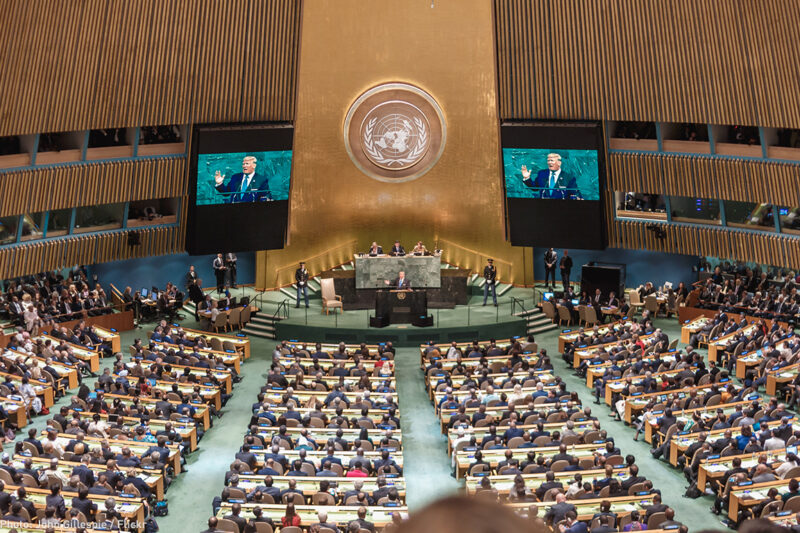At U.N., Trump Hides Behind ‘Sovereignty’ to Shield His Administration From Scrutiny


This morning, in his first speech to the United Nations General Assembly, President Trump deployed a transparent and familiar tactic to justify a shameful record: an appeal to national sovereignty over human rights.
In his address, Trump mentioned “sovereignty” 21 times. That’s in contrast to a single reference to “human rights.” The United Nations, he stated, “was based on the vision that diverse nations could cooperate to protect their sovereignty, preserve their security and promote their prosperity.” That may be, but it’s far from the full picture.
The U.N., and other international institutions that the United States helped build after the horrors of World War II, recognized that without justice and fundamental human rights, there can be no peace or security. As a result, the 1945 is actually more rigorous in its requirements that “human rights and fundamental freedoms” be protected and defended than it is in its defense of national sovereignty. Indeed, it explicitly assigned to the General Assembly the responsibility of “assisting in the realization of human rights and fundamental freedoms for all without distinction as to race, sex, language, or religion.” The set out those rights in clear terms just a few years later.
In a world that places sovereignty above all, there can be no conflict resolution or meaningful protections against human rights abuses or authoritarian regimes. Each country could escalate its human rights violations and suppress democratic freedoms within its own borders, immune from external pressure and international accountability.
Clearly, this is the world that Trump seeks. By emphasizing national sovereignty over human rights, he would deflect attention from the domestic human rights abuses his administration is committing every day. He knows his agenda runs directly counter to the human rights norms promoted by international law, and his speech sends a clear signal to the world: Back off.
Since Trump’s inauguration, the U.N. high commissioner for human rights has criticized the president’s , , and in addressing surges in white supremacist violence. A U.N. special rapporteur on torture has appealed to Trump not to reinstate . A diverse group of U.N. human rights experts as a threat to fundamental human rights across broad topic areas.
This agenda is subject to scrutiny at the current session of the U.N. Human Rights Council in Geneva, which is also happening now. Tomorrow, a U.N. expert tasked with monitoring the human rights of indigenous peoples will present a on her visit to the United States, in which she explicitly criticizes the administration’s decision to approve construction of the Dakota Access Pipeline and the “militarized, at times violent, escalation of force by local law enforcement and private security forces.” Last week, a group of human rights experts presented a , expressing concern regarding “serious issues relating to the arbitrary deprivation of liberty in the United States in the context of immigration, criminal justice, health-related confinement and the situation at Guantanamo Bay.”
The president’s agenda presents no shortage of human rights violations. He has also taken steps to ramp up mass incarceration, as well as escalated the militarization of policing and dismantled community policing initiatives. He has rescinded the DACA program, upending the lives of 800,000 young immigrants, and slashed refugee admissions. He is seeking to legalize discrimination against LGBT people, especially transgender people.
The America that President Trump wants to preserve through isolation and “national sovereignty” is a cover for those who want to attack vulnerable Americans and undermine democratic freedoms. It is one of many attacks on the basic truth that the United States is a country of immigrants and is greatest when it rejects racism, discrimination, xenophobia, and fear-mongering, because only then can it serve as an example to the rest of the world.
So when you hear the president appeal to “sovereignty,” don’t be fooled. He is using that term to justify violations of human rights in this country and around the world.

